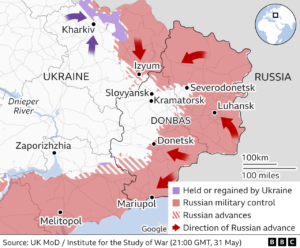
Pic courtesy BBC
Being prepared for war is one of the most effective means of preserving peace.
– George Washington
Russia – Ukraine war has entered the fourth month, with no end in sight. This war has affected every aspect of warfare and international engagement. The war has brought into focus the issues related to the new emerging world order, multilateralism, collective security, nuclear deterrence, economic sanctions, information warfare, and food & energy security.
While the world is eagerly waiting for the end of this conflict, a lot of lessons are emerging from the prevailing situation.
- The whole of Government Approach. Wars are no longer restricted to only the military domain. A whole of government approach is required to deal with the situations arising before the war, during the war, and post-war. Synergy is required between various government agencies and departments.
2. Collective Security. Collective security is relevant if one joins a military alliance. So far India has not ever joined any military alliance, and it is also evident that one has to fight its own battles. Therefore, it is important to increase the deterrence value of our defence forces. Collective security still has relevance in dealing with grey zone situations using diplomatic support, intelligence sharing, cyber, and information warfare. Support can also come in the form of a supply of weapons, ammunition, and spares. In the present circumstances, it is worthwhile to increase interoperability with a few friendly nations by carrying out exercises and developing commonality of equipment, procedures, and tactics.
3. Multilateralism. In modern times the effectiveness and relevance of multilateral institutions have come under question. Moreover, the shift is taking place toward unilateralism, with the formation of regional alliances with a limited number of members, dealing with common issues. Engagement with these bodies needs to be issue-based.
4. Self-Reliance. This lesson has got reinforced once again. Besides self-reliance in military equipment and defence production, it needs to be attained in much a larger sense, including all facets that can be used in a hostile way. The government has provided a fresh impetus to the “Atma-nribharta”, and these initiatives need to be encouraged and supported.
5. Energy Security. The energy supply chain is the first casualty in any war. Both long and short-term energy security plan is essential. The issue needs to be addressed holistically by optimum utilisation of domestic resources, maintaining multiple and alternative sources for procurement, enhancing storage capability, and enhancing alternative renewable energy sources.
6. Nuclear Deterrence. Nuclear strategists and analysts believe that nuclear deterrence works against nuclear war. However, in this case, nuclear muscle-flexing (Putting the nuclear forces on alert and issuing of strongly-worded warning) by Russia seems to have worked in keeping US, EU, or NATO from jumping into the fray directly. Another aspect is that at the time of the breakup of the USSR, Ukraine had nuclear assets that it surrendered. Russian course of action would have been different if Ukraine had retained nuclear capability. This aspect may encourage a nuclear arms race in the future.
7. Out of Area Contingencies. India has its citizens spread the world over. In times of disaster, this diaspora needs evacuation or assistance. Some contingency plans do exist, however, these plans need to be made comprehensive and reviewed periodically. At times, the evacuation of Indian citizens is coordinated with the supply of relief material to the disaster area. The media generally goes overboard about the evacuation, underplaying the effort of providing relief material and aid.
Bottom Line
War has never solved any problem.
Yet man keeps fighting.
It is in his DNA.
Question
Why is Russia not using its full combat potential?
Coming Up
Warfare lessons and Airpower lessons
Suggestions and value additions are most welcome
For regular updates, please register here
https://55nda.com/blogs/anil-khosla/subscribe/
Disclaimer:
Information and data included in the blog are for educational & non-commercial purposes only and have been carefully adapted, excerpted, or edited from sources deemed reliable and accurate. All copyrighted material belongs to respective owners and is provided only for purposes of wider dissemination.
References and credits
4. https://www.nytimes.com/2022/03/13/world/europe/russian-airstrike-poland-ukraine-nato.html
5. https://warontherocks.com/understanding-the-russo-ukrainian-war-a-guide-from-war-on-the-rocks/
6. https://warontherocks.com/2022/03/the-dangerous-allure-of-the-no-fly-zone/
7. https://www.vifindia.org/article/2022/march/09/russo-ukraine-war-air-power-analysis
8. https://warontherocks.com/episode/warcast/26495/russian-air-force-on-the-sidelines-for-now/
11. https://www.aerosociety.com/news/air-war-over-ukraine-the-first-days/
12. https://chanakyaforum.com/air-power-in-ukraine-conflict/
15. https://www.19fortyfive.com/2022/05/russia-air-force-problems-ukraine/

Excellent lessons. Must learn them in the Indian context too.
Thanks
A very comrehensive article, in your ‘meat of the matter’ format.
Thanks sir
As my AF gurus used to say
निचोड